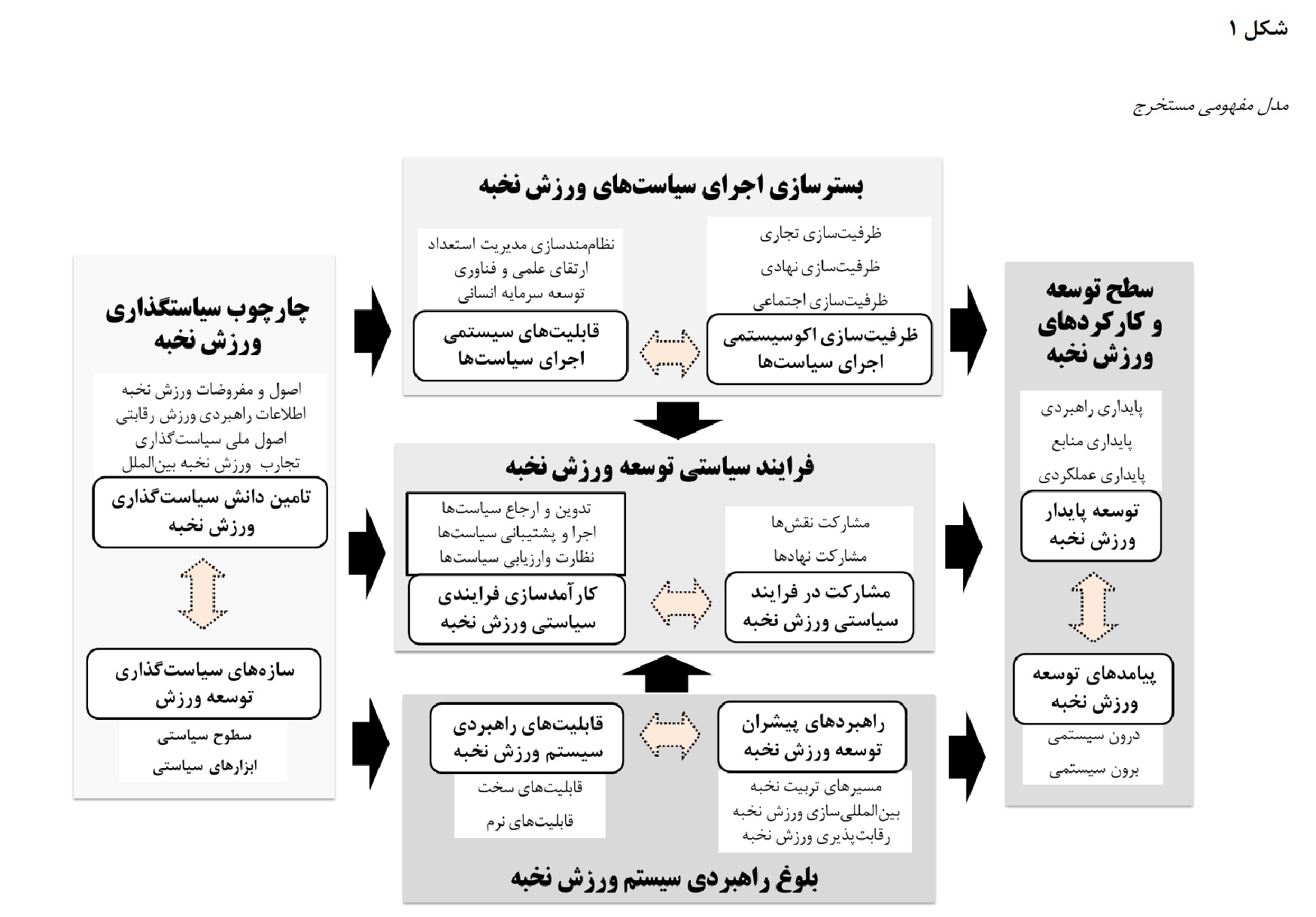سیاستگذاری بلوغ ورزش نخبه ایران: نقش بسترها، فرایندها و سطوح توسعه
کلمات کلیدی:
بلوغ ورزش نخبه, توسعه ورزش, ورزش نخبه, سیاستگذاریچکیده
هدف از پژوهش حاضر تحلیل سیاستگذاری بلوغ ورزش نخبه ایران: نقش بسترها، فرایندها و سطوح توسعه بود. روش تحقیق از نوع کیفی با رویکرد تحلیل سیستماتیک میباشد. جامعه آماری شامل کلیه اعضای هیأت علمی تربیتبدنی، مدیران و کارشناسان سازمانهای اجرایی، حرفهای ورزشی و اسناد و منابع علمی بود. نمونه آماری به تعداد قابل کفایت بر مبنای اشباع نظری بهصورت هدفمند و در دسترس انتخاب و مورد نظرخواهی قرار گرفتند (16 نفر و 28 سند). ابزارهای پژوهش شامل مطالعه کتابخانهای نظاممند و مصاحبه نیمه ساختاریافته بود و روایی ابزار با استفاده از روشهای رواییسنجی کیفی مطلوب ارزیابی شد (روایی محتوایی). از روش کدگذاری و چارچوببندی مفهومی برای تحلیل یافتهها استفاده گردید. چارچوب مفهومی سیاستگذاری ورزش نخبه در ایران در 10 منظر شناسایی شده و در 5 سطح مفهومی چارچوب سیاستگذاری ورزش نخبه، بسترسازی اجرای سیاستهای ورزش نخبه، فرایند سیاستی توسعه ورزش نخبه، بلوغ راهبردی سیستم ورزش نخبه و سطح توسعه و کارکردهای ورزش نخبه میباشد. چارچوب ارائه شده در این پژوهش، شناختی از ابعاد سیاستگذاری توسعه ورزش نخبه را بر اساس ارتباط آن با مجموعهای از فعالیتهای مختلف ایجاد میکند. بر پایه این چارچوب، میتوان به ارزیابی عینی از سطح فعالیتهای مدیریت در ورزش نخبه پرداخت و اطلاعات علمی در زمینه اقدامات مناسبی را که باید سازمانهای ورزشی برای توسعه سیاستگذاری توسعه ورزش نخبه انجام دهند، فراهم ساخت.
دانلودها
مراجع
Bramham, P., Hylton, Kevin, Jackson, Dave. (2007). Sports development: Policy, process and practice. Routledge.
De Bosscher, V. (2008). The global sporting arms race: An international comparative study on sports policy factors
leading to international sporting success. Meyer & Meyer Verlag.
https://books.google.com/books?hl=fa&lr=&id=41PXkIRtgSMC&oi=fnd&pg=PA13&dq=.+(2008).+A+Global+s
porting+arms+race.+An+international+comparative+study+on+sports+policy+factors+Leading+to+international+s
porting+success.+Aachen,+DE:+Meyer+%26+Meyer.&ots=8YYzXhR2df&sig=MuC5xtMhX3j2c950G_Mh6NA1
gIo#v=onepage&q=.%20(2008).%20A%20Global%20sporting%20arms%20race.%20An%20international%20co
mparative%20study%20on%20sports%20policy%20factors%20Leading%20to%20international%20sporting%20s
uccess.%20Aachen%2C%20DE%3A%20Meyer%20%26%20Meyer.&f=false
De Bosscher, V., De Knop, Paul, van Bottenburg, Maarten. (2008). sports, culture and society: why the netherlands are
successful in elite sports and belgium is not? a comparison of elite sport policies. Kinesiologia Slovenica, 14(2), -.
&asa=Y&AN=41028143&h=XDYfNJmgvDZkzlZXayZ4eXRXvpgHxaTXlz0JUDiXELRz4URCmQ4g793cjEa6
desdpHFH5b5vgEO7wN2KNi25cA%3D%3D&crl=c
De Bosscher, V., De Knop, Paul, Van Bottenburg, Maarten, Shibli, Simon. (2006). A Conceptual Framework for
Analysing Sports Policy Factors Leading to International Sporting Success. European Sport Management Quarterly,
(2), 185-215. https://doi.org/10.1080/16184740600955087
De Bosscher, V., De Knop, Paul, van Bottenburg, Maarten, Shibli, Simon, van Bottenburg, Maarten, Shibli, Simon,
Bingham, Jerry. (2009). Explaining international sporting success: An international comparison of elite sport systems
and policies in six countries. Sport Management Review, 12(3), 113-136.
https://doi.org/https://doi.org/10.1016/j.smr.2009.01.001
De Bosscher, V., Sotiriadou, Popi, van Bottenburg, Maarten. (2013). Scrutinizing the sport pyramid metaphor: an
examination of the relationship between elite success and mass participation in Flanders. International Journal of
Sport Policy and Politics, 5(3), 319-339. https://doi.org/10.1080/19406940.2013.806340
Gao, R. Y. (2017). A comparison between Talent Identification and Development (TID) for badminton in China and the
UK https://dspace.stir.ac.uk/handle/1893/25675
Green, B. C. (2005). Building sport programs to optimize athlete recruitment, retention, and transition: Toward a
normative theory of sport development. Journal of Sport Management, 19(3), 233-253.
https://doi.org/10.1123/jsm.19.3.233
Hasani, R., Nemati, Nematullah, Bagherpour, Tahereh. (2023). Identifying and Validating Strategies Affecting the
Development of E-sports Clubs in Iran. Communication Management in Sport Media, 10(4), 29-41.
https://doi.org/10.30473/jsm.2022.62905.1599
Houlihan, B. (2005). Public sector sport policy: Developing a framework for analysis. International Review for the
Sociology of Sport, 40(2), 163-185. https://doi.org/10.1177/101269020505719
Rahimi Pordanjani, A., Rashidiniya, Mostafa, Mirzaee, Bahman. (2017). The relationship between economic capital and
the development goals of Sports success wrestlers in freestyle and Greco-national youth team. Contemporary Studies
On Sport Management, 7(14), 43-52. https://doi.org/10.22084/smms.2018.14412.2088
Ramzaninejad, R. (2017). Basic facts of sports development and their applications in sport of iran. 91(24), 233-263
https://www.sid.ir/paper/224915/en
Renaud, A., De Bosscher, Veerle, Kempf, Hippolyt. (2018). Modelling international sporting performance: the impact of
national sport policy factors. Conference or Workshop Item, no(no), -. https://arbor.bfh.ch/10433/
Sabbaghian, A. (2016). Sport Diplomacy. Journal of Culture-Communication Studies, 16(31), 132-151.
https://www.jccs.ir/article_12599_75c9f2f7e9380acca945e71011b6cfdf.pdf
Shabani Bahar, G., Erfani, N., Goodarzi, M., & Monsef, A. (2015). Application of path analysis model in explaining
Indicators that have influence on success of sports teams in international events. Applied Research in Sport
Management, 3(3), 117-131.
https://arsmb.journals.pnu.ac.ir/article_1552_1878dffbc8a121624d3cd0c6ebcea478.pdf
Shariati Feizabadi, M., Goodarzi, Mahmood. (2016). The Effectiveness of Political System of Islamic Republic of Iran;
A Model for Evaluation. Bi-Quarterly Political Knowledge, 11(2), 95-127. https://doi.org/10.30497/pk.2016.1778
Sotiriadou, K. (2005). The sport development processes in Australia https://opus.lib.uts.edu.au/handle/2100/282
Sotiriadou, K., Shilbury, David. (2009). Australian Elite Athlete Development: An Organisational Perspective. Sport
Management Review, 12(3), 137-148. https://doi.org/10.1016/j.smr.2009.01.002
Sotiriadou, K., Shilbury, David, Quick, Shayne. (2008). The attraction, retention/transition, and nurturing process of sport
development: Some Australian evidence. Journal of Sport Management, 22(3), 247-272.












